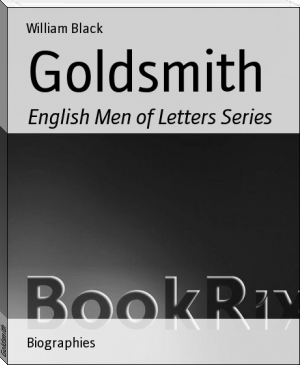Goldsmith - William Black (free novel reading sites TXT) 📗

- Author: William Black
Book online «Goldsmith - William Black (free novel reading sites TXT) 📗». Author William Black
An acquaintance, a friend as he called himself, entered;
An under-bred, fine-spoken fellow was he,
And he smiled as he looked at the venison and me.
'What have we got here?--Why this is good eating!
Your own, I suppose--or is it in waiting?'
'Why, whose should it be?' cried I with a flounce;
'I get these things often'--but that was a bounce:
'Some lords, my acquaintance, that settle the nation,
Are pleased to be kind--but I hate ostentation.'
'If that be the case then,' cried he, very gay,
'I'm glad I have taken this house in my way.
To-morrow you take a poor dinner with me;
No words--I insist on't--precisely at three;
We'll have Johnson, and Burke; all the wits will be there;
My acquaintance is slight, or I'd ask my Lord Clare.
And now that I think on't, as I am a sinner!
We wanted this venison to make out the dinner.
What say you--a pasty? It shall, and it must,
And my wife, little Kitty, is famous for crust.
Here, porter! this venison with me to Mile End;
No stirring--I beg--my dear friend--my dear friend!'
Thus, snatching his hat, he brushed off like the wind,
And the porter and eatables followed behind."
We need not follow the vanished venison--which did not make its appearance at the banquet any more than did Johnson or Burke--further than to say that if Lord Clare did not make it good to the poet he did not deserve to have his name associated with such a clever and careless _jeu d'esprit_.
CHAPTER XVI.
SHE STOOPS TO CONQUER.
But the writing of smart verses could not keep Dr. Goldsmith alive, more especially as dinner-parties, Ranelagh masquerades, and similar diversions pressed heavily on his finances. When his _History of England_ appeared, the literary cut-throats of the day accused him of having been bribed by the Government to betray the liberties of the people:[3] a foolish charge. What Goldsmith got for the _English History_ was the sum originally stipulated for, and now no doubt all spent; with a further sum of fifty guineas for an abridgment of the work. Then, by this time, he had persuaded Griffin to advance him the whole of the eight hundred guineas for the _Animated Nature_, though he had only done about a third part of the book. At the instigation of Newbery he had begun a story after the manner of the _Vicar of Wakefield_; but it appears that such chapters as he had written were not deemed to be promising; and the undertaking was abandoned. The fact is, Goldsmith was now thinking of another method of replenishing his purse. The _Vicar of Wakefield_ had brought him little but reputation; the _Good-natured Man_ had brought him L500. It was to the stage that he now looked for assistance out of the financial slough in which he was plunged. He was engaged in writing a comedy; and that comedy was _She Stoops to Conquer_.
[Footnote 3: "God knows I had no thought for or against liberty in my head; my whole aim being to make up a book of a decent size that, as Squire Richard says, 'would do no harm to nobody.'"--Goldsmith to Langton, September, 1771.]
In the Dedication to Johnson which was prefixed to this play on its appearance in type, Goldsmith hints that the attempt to write a comedy not of the sentimental order then in fashion, was a hazardous thing; and also that Colman, who saw the piece in its various stages, was of this opinion too. Colman threw cold water on the undertaking from the very beginning. It was only extreme pressure on the part of Goldsmith's friends that induced--or rather compelled--him to accept the comedy; and that, after he had kept the unfortunate author in the tortures of suspense for month after month. But although Goldsmith knew the danger, he was resolved to face it. He hated the sentimentalists and all their works; and determined to keep his new comedy faithful to nature, whether people called it low or not. His object was to raise a genuine, hearty laugh; not to write a piece for school declamation; and he had enough confidence in himself to do the work in his own way. Moreover he took the earliest possible opportunity, in writing this piece, of poking fun at the sensitive creatures who had been shocked by the "vulgarity" of _The Good-natured Man_. "Bravo! Bravo!" cry the jolly companions of Tony Lumpkin, when that promising buckeen has finished his song at the Three Pigeons; then follows criticism:--
"_First Fellow._ The squire has got spunk in him.
_Second Fel._ I loves to hear him sing, bekeays he never
gives us nothing that's low.
_Third Fel._ O damn anything that's low, I cannot bear it.
_Fourth Fel._ The genteel thing is the genteel thing any
time: if so be that a gentleman bees in a concatenation
accordingly.
_Third Fel._ I likes the maxum of it, Master Muggins. What,
though I am obligated to dance a bear, a man may be a
gentleman for all that. May this be my poison, if my bear
ever dances but to the very genteelest of tunes; 'Water
Parted,' or the 'The Minuet in Ariadne.'"
Indeed, Goldsmith, however he might figure in society, was always capable of holding his own when he had his pen in his hand. And even at the outset of this comedy one sees how much he has gained in literary confidence since the writing of the _Good-natured Man_. Here there is no anxious stiffness at all; but a brisk, free conversation, full of point that is not too formal, and yet conveying all the information that has usually to be crammed into a first scene. In taking as the groundwork of his plot that old adventure that had befallen himself--his mistaking a squire's house for an inn--he was hampering himself with something that was not the less improbable because it had actually happened; but we begin to forget all the improbabilities through the naturalness of the people to whom we are introduced, and the brisk movement and life of the piece.
Fashions in dramatic literature may come and go; but the wholesome good-natured fun of _She Stoops to Conquer_ is as capable of producing a hearty laugh now, as it was when it first saw the light in Covent Garden. Tony Lumpkin is one of the especial favourites of the theatre-going public; and no wonder. With all the young cub's jibes and jeers, his impudence and grimaces, one has a sneaking love for the scapegrace; we laugh with him, rather than at him; how can we fail to enjoy those malevolent tricks of his when he so obviously enjoys them himself? And Diggory--do we not owe an eternal debt of gratitude to honest Diggory for telling us about Ould Grouse in the gunroom, that immortal joke at which thousands and thousands of people have roared with laughter, though they never any one of them could tell what the story was about? The scene in which the old squire lectures his faithful attendants on their manners and duties, is one of the truest bits of comedy on the English stage:
"_Mr. Hardcastle._ But you're not to stand so, with your
hands in your pockets. Take your hands from your pockets,
Roger; and from your head, you blockhead you. See how
Diggory carries his hands. They're a little too stiff,
indeed, but that's no great matter.
_Diggory._ Ay, mind how I hold them. I learned to hold my
hands this way when I was upon drill for the militia. And so
being upon drill--.
_Hard._ You must not be so talkative, Diggory. You must be
all attention to the guests. You must hear us talk, and not
think of talking; you must see us drink, and not think of
drinking; you must see us eat, and not think of eating.
_Dig._ By the laws, your worship, that's parfectly
unpossible. Whenever Diggory sees yeating going forward,
ecod, he's always wishing for a mouthful himself.
_Hard._ Blockhead! Is not a bellyfull in the kitchen as good
as a bellyfull in the parlour? Stay your stomach with that
reflection.
_Dig._ Ecod, I thank your worship, I'll make a shift to stay
my stomach with a slice of cold beef in the pantry.
_Hard._ Diggory, you are too talkative.--Then, if I happen
to say a good thing, or tell a good story at table, you must
not all burst out a-laughing, as if you made part of the
company.
_Dig._ Then ecod your worship must not tell the story of
Ould Grouse in the gunroom: I can't help laughing at
that--he! he! he!--for the soul of me. We have laughed at
that these twenty years--ha! ha! ha!
_Hard._ Ha! ha! ha! The story is a good one. Well, honest
Diggory, you may laugh at that--but still remember to be
attentive. Suppose one of the company should call for a
glass of wine, how will you behave? A glass of wine, sir,
if-you please (_to_ DIGGORY).--Eh, why don't you move?
_Dig._ Ecod, your worship, I never have courage till I see
the eatables and drinkables brought upo' the table, and then
I'm as bauld as a lion.
_Hard._ What, will nobody move?
_First Serv._ I'm not to leave this pleace.
_Second Serv._ I'm sure it's no pleace of mine.
_Third Serv._ Nor mine, for sartain.
_Dig._ Wauns, and I'm sure it canna be mine."
No doubt all this is very "low" indeed; and perhaps Mr. Colman may be forgiven for suspecting that the refined wits of the day would be shocked by these rude humours of a parcel of servants. But all that can be said in this direction was said at the time by Horace Walpole, in a letter to a friend of his; and this criticism is so amusing in its pretence and imbecility that it is worth quoting at large. "Dr. Goldsmith has written a comedy," says this profound critic, "--no, it is the lowest of all farces; it is not the subject I condemn, though very vulgar, but the execution. The drift tends to no moral, no edification of any kind--the situations, however, are well imagined, and make one laugh in spite of the grossness of the dialogue, the forced witticisms, and total improbability of the whole plan and conduct. But what disgusts me most is, that though the characters are very low, and aim at low humour, not one of them says a sentence that is natural, or marks any character at all." Horace Walpole sighing for edification--from a Covent Garden comedy! Surely, if the old gods have any laughter left, and if they take any notice of what is done in the literary world here below, there must have rumbled through the courts of Olympus a guffaw of sardonic laughter, when that solemn criticism was put





Comments (0)